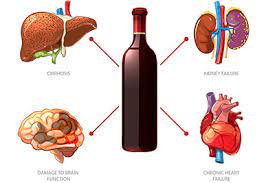The effects of alcohol on your body: Side effects, dangers and health risks
The second most commonly used substance in the United States is Alcohol, just behind tobacco. The 2019 National Survey on Drug Use and Health found that 86% of Americans aged 18 and over reported having used alcohol at one time or another in their lives.
While Alcohol can make someone happy, pleasant, and social for short periods in some cases, it can also lead to alcohol dependence or alcohol addiction. Officially, this is known as an alcohol use disorder. Chronic alcohol abuse can also lead to other mental and cognitive health problems, such as learning and memory impairments and exacerbating or causing severe mental health conditions like anxiety and depression.
The body is also affected by Alcohol. There is evidence that alcohol can harm your body and mind.
What does Alcohol do to your physical health?
Drinking any amount of alcohol can harm your health and well-being. A total of 95,000 people, approximately 68,000 men and 27,000 ladies, die each year from alcohol-related causes. More than half of these deaths are due to adverse health effects such as heart disease or liver disease.
Is there a safe amount of Alcohol?
Research suggests that alcohol consumption may be beneficial for cardiovascular health. However, a 2018 study in The Lancet shows zero is the safest level. The U.S. The U.S. Dietary Guidelines for Americans state that “adults aged 21 and older should drink no more than two drinks per day.” Women should drink no more than one drink. Women absorb and metabolize alcohol differently from men. Drinking less is better for your overall health. Among those who drink alcohol, a higher average alcohol intake is associated with a greater risk of all causes of death than fewer.
The Body’s Short-Term Effects on Alcohol
Your body reacts to even a small amount of Alcohol in various ways.
- Brain: The chemicals and pathways that your brain uses to control your body can be slowed down by Alcohol. This can alter your mood, slow down reflexes, and affect balance. It can also affect learning, memory, sleep, and other areas.
- Heart: Alcohol increases heart rate and blood flow, which causes warmth. However, the heat is lost through the skin, causing the body’s temperature to drop after it has increased.
- Digestive Alcohol is initially broken down in the stomach. This promotes an increase in digestive juices. It can also irritate the small intestines and colon, further broken down and absorbed. This can lead to diarrhea, abdominal pain, and bloating.
- Kidney – Alcohol dehydrates the body and can cause damage to the kidneys. It can also affect hormones that regulate kidney function.
- Liver Most alcohol- most of it- is metabolized by the liver. This organ filters blood and removes or destroys harmful substances. Although the liver can handle some alcohol, if a person continues drinking, it can cause permanent damage.
Binge drinking is excessive drinking within a short time frame. This increases stress on the body and internal organs. It can also lead to a hangover after a drinking session. A high level of Alcohol can lead to headaches, severe dehydration and nausea, vomiting, diarrhea, and even indigestion.
Even if you only drink one occasion, excessive drinking can increase your risk of developing heart disease. These include:
- Cardiomyopathy is a condition where your heart muscle has difficulty pumping blood.
- Arrhythmias is an irregular heartbeat.
- High blood pressure
- Stroke.
Alcohol poisoning can also be caused by excessive alcohol consumption on one occasion. It can happen when your body becomes overwhelmed by Alcohol and cannot properly process it. This can harm your breathing rate, gag reflex, and heart rate. A severe alcohol poisoning can cause a coma or even death.
Long-term effects of alcohol on the body
Alcohol can cause damage to many vital organs in the body if consumed excessively or for prolonged periods. These health hazards include:
- High cholesterol and cardiovascular health risks.
- Brain health risks. The long-term effects of Alcohol can harm memory, learning and behavior. Abusing alcohol can lead to:
- Brain shrinkage.
- Grey matter loss
- White matter loss
- Liver health risks. Although your liver is strong, it can’t keep up with excessive alcohol consumption, which increases your risk of developing:
- Steatosis – Fatty liver
- Hepatitis A.
- Fibrosis.
- Cirrhosis.
- Liver cancer.
- Many health risks are associated with pancreatic disease, including vitamin deficiencies. Poor dietary habits and malabsorption can lead to vitamin deficiencies. Chronic alcohol intake may lead to pancreatitis. This is inflammation and blood vessel swelling in the pancreas. This can affect your ability to absorb nutrients and digest food.
- Health risks. Too much alcohol can cause damage to your immune system. Infections and other diseases can be prevented.
- Higher likelihood of developing cancer. Alcohol, a well-known carcinogen, can influence the development of many types of cancers. There is clear evidence that alcohol, especially when combined with smoking, can increase the risk of developing colorectal, breast, liver, esophageal and head cancers. Evidence is emerging that melanoma and prostate cancer are at higher risk. According to the National Cancer Institute, alcohol consumption can increase head and neck cancer risk by as much as 2 or 3 times for people who consume 3.5 drinks per day.
- Risks to your musculoskeletal health. Drinking Alcohol can cause bone weakness, leading to fractures and broken bones. People with an alcohol abuse disorder are more likely to have high uric acid or gout levels.
Take our Substance Abuse Self Assessment
If you suspect that you or someone close to you may be suffering from substance abuse, take our 5-minute self-assessment. It can be used to help you assess the severity of your substance abuse disorder. This evaluation is made up of 11 questions. The result is confidential and free of charge.
Alcoholic and Traumatic Injuries
The effects of Alcohol on psychomotor and cognitive functioning can lead to dangerous and possibly fatal physical consequences. Also, Alcohol can reduce inhibitions. This can make it more likely to make rash, irrational or reckless actions. This can have serious consequences, including violence and accidents.
- Violent behavior has increased, including homicide and violence with intimate partners.
- Increased chance of injury from car accidents and accidental drowning.
- Suicide risk
- Sexually risky behavior can increase the chance of unintended pregnancy or sexually transmitted disease.
These consequences can lead to serious injury and even death. The most common causes of death from alcohol-related injuries are drownings and fatal burns in 60% of deaths. 22Additionally the consequences of Alcohol during pregnancy can prove to be devastating for both mother and child.




Post Comment